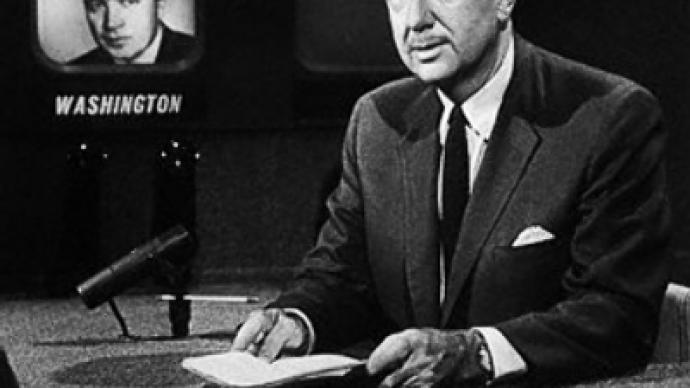Walter Cronkite: a salute to journalism's last hero

Few journalists have aspired to the level of personal bravery displayed by the late Walter Cronkite, who criticized the powers-that-be with as much relish as he reported on them.
In the tumultuous years from 1962 to 1981, Cronkite was the man America had entrusted to their living rooms each evening to tell them the news – from the assassinations of John F. Kennedy and Martin Luther King, to anti-war protests, to Watergate and the Iranian hostage crisis. Admirers included his media peers.
“It’s hard to imagine a man for whom I had more admiration,” Mike Wallace of “60 Minutes” told CNN. “… He was a superb reporter and honorable man.”
“Walter was who I wanted to be when I grew up,” said CBS’s news host Bob Schieffer, 72, who started his career with CBS News in 1969.
“He set a standard for all of us,” Schieffer said of Cronkite, as quoted by AP. “He made television news what it became.”
But those standards that Cronkite set down for the media, which demanded a high level of courage and personal sacrifice, seem to have been forgotten. Cronkite did not just mindlessly recite the news each evening; Cronkite took a personal involvement in his work, and encouraged his audience to do the same.
Perhaps the greatest risk Cronkite took as a television reporter was when he made the decision to speak out against the Vietnam War. Shortly after the Tet Offensive, when it became clear that America’s war against the Viet Cong was turning into an unwinnable quagmire, Cronkite paid a visit to Vietnam. His trip confirmed to him that America was fighting a losing battle, and he said as much to the American public in the following televised comments, delivered with his trademark grainy voice and steely-eyed conviction:
“We have been too often disappointed by the optimism of the American leaders, both in Vietnam and Washington, to have faith any longer in the silver linings they find in the darkest clouds… For it seems more certain than ever that the bloody experience of Vietnam is to end in a stalemate. This summer’s almost-certain standoff will either end in a real give-and-take negotiations or terrible escalations; and for every means we have to escalate, the enemy can match us, and that applies to invasion of the North, the use of nuclear weapons, or the mere commitment of one hundred, or two hundred, or three hundred thousand more American troops to the battle. And with each escalation, the world comes closer to the brink of cosmic disaster…”
Cronkite’s no-holds-barred assessment of the Vietnam War led then-President Lyndon Johnson to utter the following comment, which underscores the (potential) powers of the fourth estate: “If I’ve lost Cronkite, I’ve lost Middle America.”
In our present age of intensely-concentrated media conglomerations, when a handful of private investors present the facade of an “independent” media, such candid views are as rare as diamonds in a sandbox.
This was most conspicuous during the ongoing war in Iraq, which in its earliest stages received virtually no criticism from the top media players. Worse, any program (CNN’s Talk Back, for example, the Phil Donahue show or the Connie Chung Show) that potentially threatened to challenge the idea of going to war in Iraq was simply axed, an act usually explained away as the invisible hand of “market demands.” Incidentally, the three abovementioned shows, which would have aired public opinions on the war, were all replaced by live reports from Iraq.
Cronkite’s longevity gave him the luxury of being able to compare the lessons of the Vietnam War with the present slog in Iraq. Two years ago, at the age of 90, Cronkite was interviewed by CBS television. His comments prove that old age had not dissolved his fierce convictions regarding right and wrong.
“We should have gotten out a long time ago,” Cronkite said. “This is a mistake, the entire war there is, it’s a disaster… Look at the loss of lives of our young Americans there and those who have been maimed for life, for what purpose? No purpose we can define.”
CBS then asked if his disapproving words would carry the same weight that as his words against the Vietnam War.
“Well, I think it’s a little late for that, now,” Cronkite said. “I would like to think it would be helpful in getting us out of there. Anybody who can put another match to that fire, to get us out would, I think, be welcome.”
But for Cronkite, the real war seemed to be the one occurring in the media, where the hearts and minds of the public are won and lost.
“I’ve been increasingly and publicly critical of the direction that journalism has taken of late,” Cronkite told an audience recently during the launch of a new media channel. “And of the impact on democratic discourse and principles. Like you, I’m deeply concerned about the merger mania that has swept our industry, diluting standards, dumbing down the news, and making the bottom line sometimes seem like the only one. It isn’t and it shouldn’t be.”
Then Cronkite took the challenge directly to the journalists and media.
“Here at home… we need to make it possible for people to speak out when they feel they’ve been wronged, even if it means shaming newsrooms to do the right thing. Journalists shouldn’t have to check their consciences at the door when they go to work for a media company. It ought to be just the reverse.”
Now compare these words with the modern realities. Did the American people have a real opportunity to question the war in Iraq in a public, democratic debate? How do we explain, for example, Rupert Murdoch’s thousands of Clear Channel radio broadcasts, all of which trumpeted the call for war prior to the invasion? And what happened when one musical group, the Dixie Chicks, criticized US President George W. Bush? Clear Channel suddenly morphed into Censorship Channel, as the Dixie Chicks were axed across the country.
In a keynote address at Columbia University in New York (Feb. 9, 2007), Cronkite lamented the consolidation of media that forced reporters and journalists to “do ever more with less.”
“In this information age and the very complicated world in which we live today, the need for high-quality reporting is greater than ever,” Cronkite told graduating journalism students at Columbia’s School of Journalism. But the threat was much more than simply the journalist’s job.
“It’s not just the journalist’s job at risk here. It’s American democracy. It’s freedom.”
Walter Cronkite, who once served as United Press's main correspondent in Moscow for two years, died with his family at his side on July 17, 2009. He was 92.













